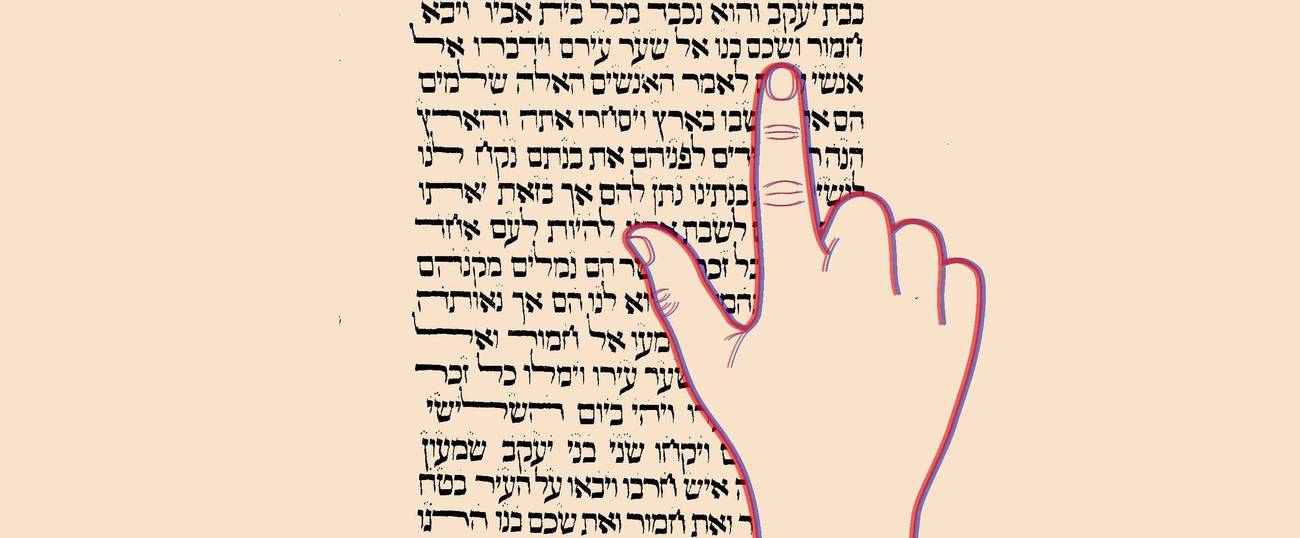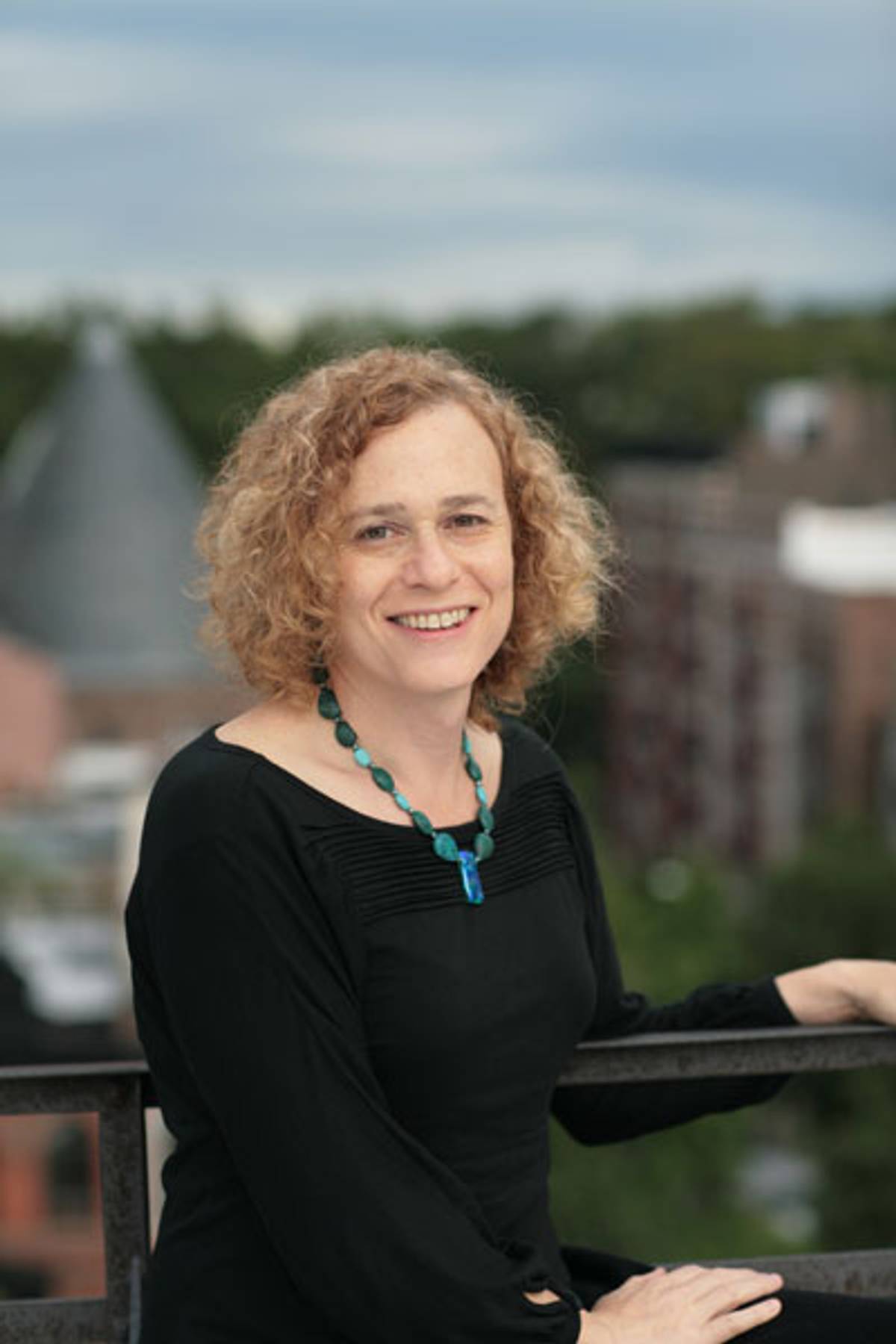Torah, From a Transgender Perspective
Joy Ladin’s new book, ‘Soul of the Stranger,’ explores her intimate connection with God




“If I were God, and I wanted to invent religion, and the material I had to work with was a patriarchal society, I would make the religion as patriarchal as I could,” Joy Ladin told me when we spoke by phone recently. This may seem like a surprising comment coming from a transgender Jewish poet and scholar, but Ladin is a person of faith and this stance informs the trans theology at the center of her new book, The Soul of the Stranger: Reading God and Torah from a Transgender Perspective, in which Ladin offers close readings of key biblical passages to question pervasive assumptions about a religiously mandated gender binary. For Ladin, God is not particularly invested in gender, and the patriarchal language of the Torah reflects a pragmatic rather than an ideological choice, a strategic move motivated by the need to perpetuate religion in a world in which, as she went on to explain, “people won’t transmit texts that deal with gender in ways they don’t understand.” Her statement echoes Maimonides oft-cited assertion that “the Torah speaks in the language of men.”

But while the language of the Torah is fundamentally patriarchal, Ladin’s reading reveals a surprising degree of flexibility and openness in the Torah’s treatment of gender. At the same time, Ladin—who has published 10 books of poetry and a memoir, as well as numerous essays—insists that her reading here does not aim to “queer” the Torah. “My goal isn’t to produce a different Torah,” she said. “I love the Torah as it is, in all of its strangeness, and I strongly feel that the greatness of the Torah is that we don’t have to change it for our perspectives to bring it to life and enable it to grow.”
Ladin’s book is hard to categorize: Neither strictly scholarly, nor purely autobiographical, The Soul of the Stranger defies boundaries as it moves between and across multiple genres, drawing on personal experiences to illuminate sacred texts, and using Torah as a mirror to reflect the complexities of human life. Reading the story of Jonah from a transgender perspective, Ladin suggests that the prophet’s predicament is one that resonates with the experience of transgender individuals who are desperate to “avoid living as the person (in Jonah’s case, as the prophet) they know themselves to be.” But Ladin is careful to point out that the trans experience, for all its particularities, is not something apart from but rather intrinsic to our shared humanity. “Trans experience is human experience,” Ladin said, because “everyone has experiences of not fitting assigned roles and definitions.”
Analyzing the creation narratives in Genesis, Ladin demonstrates that “Adam is human before he is gendered,” and that even when the Torah asserts the gender binary in Genesis 1:26-27, it does so without attaching any meaning, symbolic or otherwise, or assigning specific roles to gender. Ladin’s trans-reading of these texts seeks to foreground what she sees as the Torah’s fundamental ambivalence about the gender binary, a binary she sees “not as a divine decree but as a human invention.” Read through this lens, transgender identities, though they may seem “new and startling,” are in fact, according to Ladin, “direct descendants of the biblical genesis of gender.”
“I don’t see trans experience as being outside the range of experiences the Torah addresses,” Ladin said. “It’s not about how from birth to death everyone’s the same and never changes.” But Ladin’s reading is not simply about finding ways to stretch the Torah to accommodate transgender lives and experiences. Instead, she puts trans at the center of her theology, highlighting what she sees as Torah’s evocation of trans experience, particularly in its depictions of human encounters with the divine. Thus, for example, Ladin argues that God’s relationship with Abraham hinges on his willingness to defy his assigned gender role as a son by abandoning his father in order to follow the divine command. Similarly, Ladin interprets Sarah’s miraculous conception after a lifetime of infertility as a blessing from God that comes precisely through a queering of her identity as a woman well past childbearing age.
For scholars, rabbis, and activists in the trans Jewish community, the timing of Ladin’s book is especially auspicious. “What I think is most significant about this book is the fact that she’s addressing theologies in Genesis from a trans perspective,” said Max Strassfeld, who teaches transgender studies, Jewish studies, and rabbinic literature at the University of Arizona. “In this political environment where the government is trying to say that trans people do not exist, her work is vitally important in centering trans readings of the texts that transphobes are misinterpreting.”
While Ladin’s book is not exactly a trans manifesto, the author’s agenda is unambiguous, and highly ambitious. “My ideal audience is really everybody,” Ladin told me. Short of that, she hopes that her book “will be able to speak to trans and queer people who feel alienated from but interested in religion.” Ladin also wants her book to reach a nontrans, religious readership: “I’m hoping they will read this and say, ‘Oh, I thought the trans perspective was just about thinking about accommodating strange people. I never thought that it would enrich my understanding of the texts.’”
That was precisely the sentiment voiced by Rabbi Mike Moskowitz, a scholar in residence at Congregation Beit Simchat Torah in New York City and a vocal trans advocate, who calls Ladin a mentor and a friend. As Moskowitz put it when we spoke by phone, “Religion is about a relationship with God, and when we get to see how different people relate to God, it provides a more expansive and more holistic understanding of God.”
God, in fact, is at the very center of this book, and for all its wonderful close readings of biblical texts, Ladin’s work is at its most poignant and convincing when she talks about God. Perhaps this is because for Ladin God is not an abstract concept but a “living presence.” As Ladin puts it in the book’s opening lines: “For as long as I can remember, I felt that I was female, and for as long as I can remember, I have felt God’s presence.”
Though she resists drawing a causal link between her trans experience and her idiosyncratic connection to God, the two are core aspects of Ladin’s identity, each one bolstered, it seems, by the other. Reflecting on her experiences as a transgender child tortured by feelings of alienation and invisibility, Ladin recalls drawing comfort from the presence of a God who she believed could see her true self. At the same time, her notion of God as someone who could not fit the gender binary validated Ladin’s sense of herself in a world that seemed to have no room for those who were not always and only male or female.
Not surprisingly, it is in these reflections on her own encounters with the divine that Ladin’s poetic voice comes forth most exquisitely. As she says early on in this book: “God never mistook me for the body others saw. God knew who I truly was, and understood how alone I felt, because God, like me, had no body to make God visible, no face human beings could see.”
While Ladin makes a compelling text-based argument for trans inclusivity, the true force of this work is not in its parshanut, but rather in its lyrical evocation of the author’s relationship with the divine. As Steven Philp, a poet, rabbinical student, and senior rabbinic intern at CBST, who provided research and editorial assistance for Ladin’s book, told me, “A lot of the [trans] writing that has come before has been academic and halakhic. Joy’s work speaks in a deeply personal voice to who we are in the world, how we experience each other, and in this case how we experience God.”
Ladin’s is a particularly intimate experience of God, a God whom she nevertheless sees as fundamentally other. Her paradoxical conception of God as at once deeply familiar and also wholly unknowable is central to her thinking about trans matters, and to her broader argument for greater inclusivity. Ladin makes frequent reference to the biblical notion of humankind as created in the image of God, an image that she insists has “nothing to do with sex, gender, human differences, or human bodies,” but one that she thinks, or at least hopes, can serve as a reminder that we are all, trans and nontrans alike, strangers. “All of us, like God, dwell among and love those who cannot fully know or understand us,” writes Ladin. At the same time, Ladin’s insistence on God as the ultimate stranger underscores the inherent divinity of even—or especially—the most alienated among us.
***
Like this article? Sign up for our Daily Digest to get Tablet magazine’s new content in your inbox each morning.
Shoshana Olidort is a PhD candidate in Comparative Literature at Stanford University. Her work has appeared in the Los Angeles Review of Books, The Paris Review, and The Jewish Review of Books, among other publications.